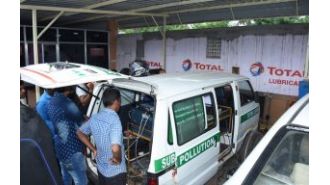A pack of wolves in Colorado, including young pups, will be caught and moved elsewhere due to attacks on livestock.
Wildlife officials in Colorado are moving two reintroduced wolves and their pups due to attacks on livestock, disrupting the reintroduction program.

After a series of incidents where wolves from the reintroduction program have attacked livestock, Colorado wildlife officials have decided to relocate two of the wolves and their pups. This is a setback for the program, which was launched just last year and has sparked controversy since its inception.
The pack of wolves, known as the Copper Creek pack, will be captured in Grand County, announced Colorado Parks and Wildlife (CPW) on Tuesday evening. While the agency did not reveal the exact location where the wolves will be moved, they cited the need to protect both the animals and CPW staff.
In a statement, CPW Director Jeff Davis explained that the decision to relocate the pack was made after careful consideration of various factors and feedback from stakeholders. He also emphasized that this action is not a precedent for how CPW will handle wolf-livestock conflicts in the future.
The ultimate goal of this operation is to relocate the pack to a new location while assessing the best options for them to continue contributing to the restoration of wolves in Colorado.
The announcement of the relocation comes just days after CPW shared a video of at least three wolf pups born this spring. These pups are the first to be born to wolves released in December as part of the voter-mandated reintroduction of the predator species, which was extirpated from Colorado almost a century ago.
The wolves in the Copper Creek pack, including the known pups, are among at least twelve individuals now roaming Colorado's mountains. Eight other adults were released in December after being captured and relocated from Oregon, and a pair of wolves from Wyoming also naturally migrated into the state. Sadly, one of the relocated wolves was found dead in the spring.
CPW will provide more information about the relocation after the targeted wolves have been captured, according to the statement. However, this has raised more questions than answers for some, including Michael Saul, director of the Rockies and Plains Program at Defenders of Wildlife, which advocated for the reintroduction. He wonders if CPW will keep the pack together during the capture and relocation process, where they will be taken, and if they will be released back into the wild at all.
He expresses concern, stating that the reintroduction is still in its early stages, and it doesn't make sense to give up on the only reproducing pack they have.
The return of wolves to Colorado has been a contentious issue, with voters narrowly approving the reintroduction program in 2020, primarily driven by those living in urban areas. Many ranchers have opposed the effort, fearing that it will threaten their livelihoods and way of life. Colorado is the first state to reintroduce these apex predators.
Since the reintroduction, wolves have killed or injured at least nine sheep and fifteen head of cattle, according to CPW's confirmed depredations list. Most of these incidents were caused by the paired wolves in Middle Park, which formed the Copper Creek pack, as stated by Reid DeWalt, CPW's assistant director for the agency's Aquatic, Terrestrial, and Natural Resources branch, during a Parks and Wildlife Commission meeting.
While there have been a few other depredations from the other wolves, they are not at the same level as those in Middle Park.
Ranchers in Middle Park have repeatedly requested that the agency take action to stop the wolf depredations, but until now, CPW has declined to intervene beyond providing non-lethal deterrent resources. In the spring, the Middle Park Stockgrowers requested a permit to allow ranchers to kill wolves that were attacking their livestock, but it was denied.
During the commission meeting, DeWalt provided an update on the wolf reintroduction effort but did not mention the possibility of relocating the wolves. Even CPW's director, Davis, did not mention it during his update to the commission.
However, DeWalt did mention that the agency plans to release more wolves this winter, as they have not yet found a state or government willing to supply them after a Washington tribe backed out of their agreement to provide wolves.
He also shared that the next batch of wolves will be released in the same northern zone as before, to increase the wolf population in that area. Additionally, CPW has hired five specialists to deal with predator damage and conflicts, primarily focusing on wolves, but also working with bears and mountain lions. They have received training in Oregon and Idaho on wolf management and how to deter depredations.
To get more news about Colorado, sign up for our Mile High Roundup email newsletter.










